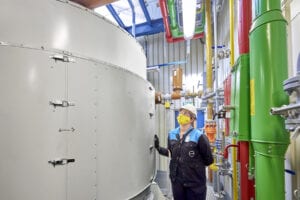
Source: Covestro
A significant breakthrough in the production of the rigid foam component MDI (methylene diphenyl diisocyanate)for the energy-efficient insulation of buildings and refrigeration devices: Covestro AG (Leverkusen, Germany) has successfully put into operation a pilot plant based on the innovative AdiP (adiabatic-isothermal phosgenation) technology at its Brunsbüttel site. The new technology promises to significantly improve energy efficiency and marks an important milestone for Covestro in its orientation towards the circular economy. At a virtual ceremony today, the plant was officially inaugurated together with Jan Philipp Albrecht, Minister of Energy, Agriculture, the Environment, Nature and Digitalization of the German State of Schleswig-Holstein.
Covestro intends to base all the company’s operations on the principles of the circular economy and is pursuing the long-term goal of climate-neutral production. “Technological innovations in the area of process technology, in particular, are an important pillar of our strategy to achieve this goal,” says Dr. Klaus Schäfer, chief technology officer (CTO) of Covestro. “AdiP is a technology we have worked on intensively in its development at multiple sites, and which once again underlines the innovative leadership of Covestro.”
“If we want to overcome the climate crisis as a society, we need ambitious and innovative impulses from the industrial sector. Innovative economic activity and climate protection are not opposites; nowadays, business and climate protection belong together. You can see this in the Covestro project presented to us today”, says Minister Jan Philipp Albrecht.
The AdiP reaction is controlled more efficiently and does not require an external heat supply, as the heat generated during the reaction process is used. As a result, this innovative production process significantly reduces energy consumption and CO2 emissions in MDI production. Thanks to AdiP technology up to 40% steam and 25% electricity can be saved per ton of MDI produced in an MDI plant – and CO2 emissions are thus reduced by up to 35%, says the company.
Another advantage of the innovative method is that the production output increases by 50% compared to the technology currently in use. As a result, future MDI production plants based on AdiP technology can be smaller than in the past.
“I am confident that the new technology will pass its practical test and become an important component of our growth strategy for MDI. At the same time, I expect AdiP to significantly improve the efficiency of our production processes,” says Daniel Meyer, head of the Polyurethanes unit at Covestro. The pilot phase should be completed in about 12 months’ time.
“I am proud of the fact that this innovative process has been implemented for the first time on a large scale at our Brunsbüttel site. And I am absolutely convinced that our employees will successfully commission the new technology and optimize it for future use in our global production network,” says Dr. Uwe Arndt, the Brunsbüttel site manager.
Covestro is one of the world’s leading producers of MDI, a raw material much in demand for producing energy-efficient insulation solutions for buildings and refrigerating devices. In 2019, the global MDI market had a volume of around 7,500 kilotons and is expected to further grow in the long term. With the new technology, Covestro is making an important contribution to achieving the climate goals of its customer industries.